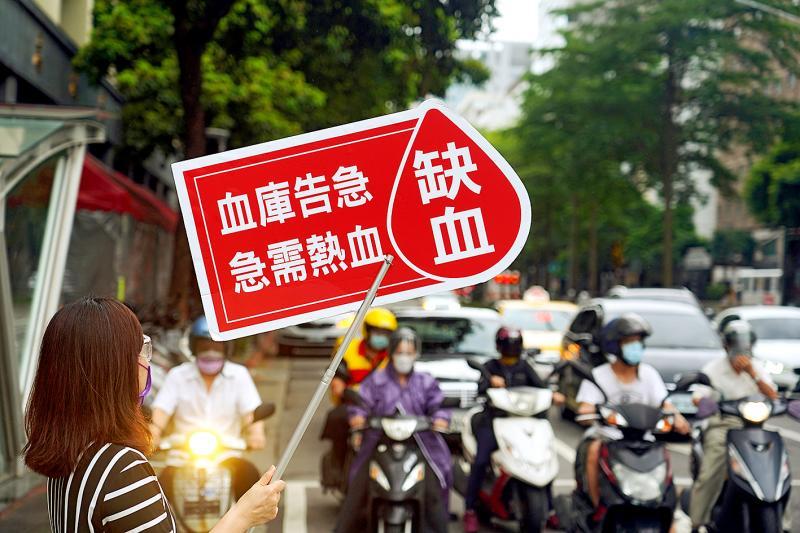A Taiwanese national who consumed cannabis gummies in Thailand has been permanently barred from donating blood in Taiwan, as cannabis remains a Category 2 narcotic in the country, the Food and Drug Administration (FDA) said yesterday.
The person, whose gender was not revealed, recently shared their experience on the social media platform Threads, saying that they tried cannabis gummies out of curiosity while visiting Thailand last year and did not expect it would result in a permanent blood donation ban, the Chinese-language media outlet CTWANT said on Monday.

Photo: CNA
Asked how the blood donation center found out about the cannabis use, the person, expressing regret over their consumption of cannabis, said that donors are asked about their medical history and any past narcotic use before giving blood, to which they "answered honestly," the report said.
"I thought using cannabis would only bar me from donating blood for a year or two ... but since cannabis is illegal in Taiwan, the law assumes there is a risk of addiction or repeat use, so I was marked as permanently ineligible for blood donation," the report said.
In response to public discussion sparked by the Threads post regarding Taiwan's blood donation criteria, FDA Deputy Director-General Wang Der-yuan (王德原) yesterday said that the decision was based on the nation's blood donor health regulations.
Under Article 5, Paragraph 3 of the regulations, people with a history of narcotic use are permanently barred from donating blood.
The Narcotics Hazard Prevention Act (毒品危害防制條例) stipulates that narcotics can be divided into four categories based on "their extent of causing habitual usage, abusive usage and danger to society."
Cannabis, along with substances such as opium poppy and amphetamines, is classified as a Category 2 narcotic under the act.
It contains more than 65 unique alkaloid compounds, with the two primary ones being tetrahydrocannabinol (THC) and cannabidiol (CBD), the Ministry of Justice Investigation Bureau said in a news release last year.
"THC affects the human central nervous system and may lead to physical dependence and related psychiatric disorders. As a result, both cannabis and THC are classified as Category 2 narcotics under the Narcotics Hazard Prevention Act," the release read.
In Taiwan, any product containing more than 10 parts per million (ppm) of THC is classified as a Category 2 narcotic, Wang said.
In contrast, the Washington State Liquor and Cannabis Board stipulates that THC concentration in edibles is measured in milligrams, with each serving limited to a maximum of 10mg of THC — a typical amount found in legally sold cannabis gummies in the US.
Assuming a cannabis gummy weighs about 5g and contains 5mg of THC, its concentration would then be about 1,000ppm, far exceeding Taiwan's legal threshold of 10ppm.

The manufacture of the remaining 28 M1A2T Abrams tanks Taiwan purchased from the US has recently been completed, and they are expected to be delivered within the next one to two months, a source said yesterday. The Ministry of National Defense is arranging cargo ships to transport the tanks to Taiwan as soon as possible, said the source, who is familiar with the matter. The estimated arrival time ranges from late this month to early next month, the source said. The 28 Abrams tanks make up the third and final batch of a total of 108 tanks, valued at about NT$40.5 billion

Two Taiwanese prosecutors were questioned by Chinese security personnel at their hotel during a trip to China’s Henan Province this month, the Mainland Affairs Council (MAC) said yesterday. The officers had personal information on the prosecutors, including “when they were assigned to their posts, their work locations and job titles,” MAC Deputy Minister and spokesman Liang Wen-chieh (梁文傑) said. On top of asking about their agencies and positions, the officers also questioned the prosecutors about the Cross-Strait Joint Crime-Fighting and Judicial Mutual Assistance Agreement, a pact that serves as the framework for Taiwan-China cooperation on combating crime and providing judicial assistance, Liang

A group from the Taiwanese Designers in Australia association yesterday represented Taiwan at the Midsumma Pride March in Melbourne. The march, held in the St. Kilda suburb, is the city’s largest LGBTQIA+ parade and the flagship event of the annual Midsumma Festival. It attracted more than 45,000 spectators who supported the 400 groups and 10,000 marchers that participated this year, the association said. Taiwanese Designers said they organized a team to march for Taiwan this year, joining politicians, government agencies, professionals and community organizations in showing support for LGBTQIA+ people and diverse communities. As the first country in Asia to legalize same-sex

MOTIVES QUESTIONED The PLA considers Xi’s policies toward Taiwan to be driven by personal considerations rather than military assessment, the Epoch Times reports Chinese President Xi Jinping’s (習近平) latest purge of the Chinese People’s Liberation Army (PLA) leadership might have been prompted by the military’s opposition to plans of invading Taiwan, the Epoch Times said. The Chinese military opposes waging war against Taiwan by a large consensus, putting it at odds with Xi’s vision, the Falun Gong-affiliated daily said in a report on Thursday, citing anonymous sources with insight into the PLA’s inner workings. The opposition is not the opinion of a few generals, but a widely shared view among the PLA cadre, the Epoch Times cited them as saying. “Chinese forces know full well that